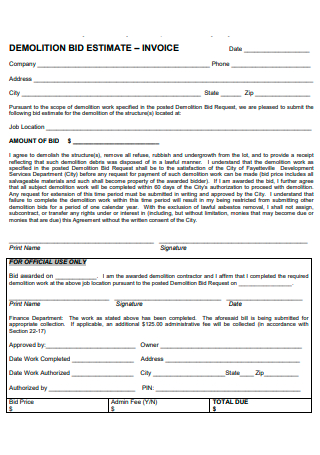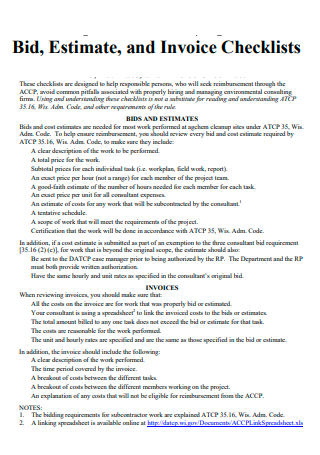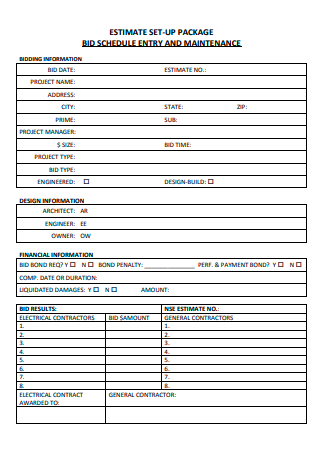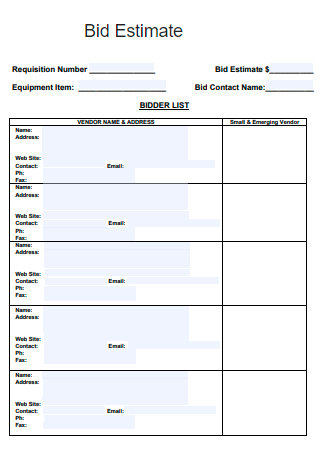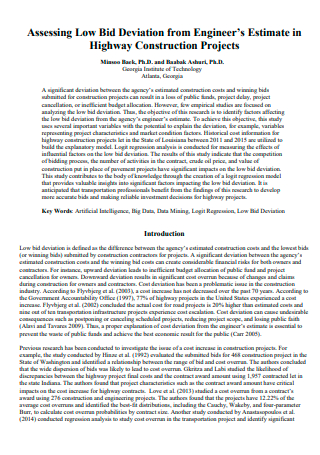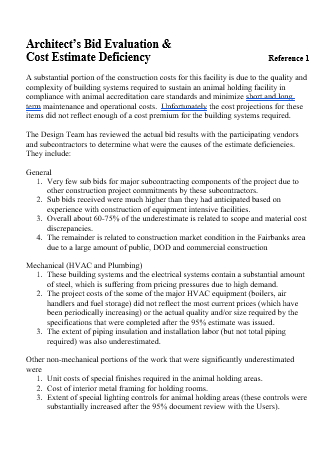The sales and marketing departments of a business play a vital role in ensuring the continuous successes of the company or establishment especially when it comes to its sustainability.…
continue reading
5+ SAMPLE Bid Estimate
What Is a Bid Estimate?
A bid estimate is a document that companies use to communicate to customers the products or services, pricing, and time period that they can offer them in order to complete a specific project. Businesses use this form to compete for business. This paper is utilized in a variety of different ways in the electrical sector. The primary objective of bid proposals is to provide prospective customers with enough information to determine whether or not the company in question is a good fit for the contract by showcasing the attributes that make up the business in question and also providing particulars on the pricing structure. If they are, then it is reasonable to conclude that the idea was a success and move forward with it.
On our website, you may find a variety of different layouts that you are free to use whenever the occasion arises. The following are some of them: There are numerous templates that are very similar to the Security Services Proposal that can be used. These include an employment contract, a Service Contract, a labor contract, a security bid proposal, a staffing agreement, a supplier-customer agreement, a compromise agreement, an IT services proposal, a tenancy contract, a Bidding Contract, and others. This post will not only supply you with templates, but it will also supply you with crucial information that you need to understand in order to finish your template.
What Should You Keep in Mind When Putting Together a Bid Estimate?
A formal request to the bidders to seek an extension of their bid validity time should be issued if it is anticipated that the contract will not be signed before the expiration of the bid validity period. This gives bidders the choice to accept or reject the offer without forfeiting their bid security, and they may be given the authority to change their Bid Price if this was stipulated in the bidding documents.
1. Maintain a Person-to-Person Approach
Use the contracting authority’s full name when addressing them. This will demonstrate to the government organization that you have read the tender document in its entirety and have not simply copied and pasted responses for each project that you have been assigned. Furthermore, addressing someone by their first name helps to establish a personal connection. Each buyer is unique, just as each Tender is, and each buyer has a particular set of expectations from the contracting authority. To that end, take your time reading the tender documentation and tailoring your response to the specific bid. If you have any difficulty understanding a particular question, please do not hesitate to ask for clarification.
2. Detailed Information on the Project
Tender documents serve as a handbook that contains all of the key information about a project, such as the government’s needs, procurement procedures, evaluation criteria, and contract awards. Tender proposals are available on the Internet. Make a thorough study of the Tender document to ensure that you are prepared to cover every area of the project and to provide a persuasive proposal that demonstrates how your talents and resources will be able to deliver high-quality outcomes.
3. It is About Them, Not About You
What distinguishes a bad bid proposal from a good bid proposal is how well you strike a balance between promoting your skillset and providing specifics about the project specifications. It is not beneficial to include excessive information about yourself or to list irrelevant abilities in order to secure a job. Instead, a few samples of similar projects that you have worked on in the past, together with a brief explanation of why you are the ideal candidate for the task, will help you catch the attention of the contracting authority.
4. Make the Benefit More Visible
When preparing a tender proposal, it is critical to provide specifics on the project’s costs, timelines, and requirements, among other things. Clearly stating the benefits that government entities will receive from your services is essential.. A tender that is well-focused on the needs of the customer has a better chance of winning than one that does not put forth the necessary effort in understanding those needs and finding a solution for them. Performing study on what government agencies are looking for from the contracting authority and coming up with more than one alternative idea for the same is essential. Make a conscious effort to remember that your solutions are outside the realm of the project’s requirements. Make an effort to demonstrate an additional positive influence that your proposal will have on the community or businesses in general by include it in your bid.
5. Put Yourself in the Position of the Buyer
Putting yourself in the position of the buyer can help you design a tender proposal with greater conviction. Ask yourself questions such as What is important to the client? and What is not important to the client? How can you bring genuine value to the needs that have been specified? What are the advantages of selecting a tender proposal that you might want to consider while making your decision?
If you believe that your bid proposal will be able to provide compelling answers to these concerns and will have a long-lasting impression on the minds of the decision-makers, you are in good shape to move further.
6. Proofreading Is Essential
Bidding involves coping with strong time constraints and intense pressure, as well as multiple management of the resource. There are more grammatical or unattended problems in the suggested draft than there are correct ones, and this will reflect negatively on your company’s reputation. We cannot emphasize enough how important it is to proofread and edit the proposals before submitting them. Given the large number of bid ideas that governments receive, they cannot afford to take the danger of making a dumb mistake that will lower their chances of receiving the contract.
7. Workers in the Background of the Film
Choose your team based on the professional strengths of the individuals who will be able to work together and achieve a single goal, which is winning the government bid. A well-organized and collaborative team that is capable of completing the job quickly and effectively is essential. Before beginning work on the tender proposal draft, it is critical to clearly identify the duties and responsibilities of each team member and to ensure that everyone is on the same page with regard to their tasks.
Elements of a Bid Estimate
Despite the fact that it is essential to any organization’s success, security is frequently neglected by organizations. Has an impact on both data and corporate property security. Competitors getting access to firm documents, data, and workflows could result in subpar performance if information security is poor. The company is responsible for ensuring adequate information security and promoting commercial property accountability. A basic security system that protects business data and property from intruders is offered for implementation by a company.
Steps in Writing a Bid Estimate
Creating an electrical bid proposal that is captivating to potential customers is a challenging task, and in order to be successful, you need to make sure that you can set yourself apart from the other companies in the industry. It is in the best interests of the Bid Manager, suppliers, and contractors to submit the most accurate and well-informed bid proposal that is possible in order to receive the best possible result from the procurement. This will allow for the biggest potential outcome from the procurement. The first phase in the process of bidding is the development of the bid proposal. This is a highly significant step. It is absolutely necessary to commit a sizeable amount of time to it in order to undertake in-depth research on the government agency that will be doing the contracting and determine what it is that they want from the tender proposal.
Step 1: Take a Look at the Job Description
Because there are a lot of different duties, each of which comes with its own set of difficulties, you need to be sure that you have read the job description all the way through before submitting a bid proposal. It is essential for independent contractors and subcontractors to take a step back and evaluate the job description to determine whether or not it matches the level of professional service they can give. It should not be difficult for you to move through with the process if you believe that your ability to make that bid is sufficient.
Step 2: Make a Plan for Your Writing
You are required to adhere to a particular structure while you are putting together your bid proposal. If you arrange it in this fashion, it will be much simpler for your client to read through it and understand what it is that you are suggesting that they do if you do so. To get started, you can think about writing out all of your qualifications in the form of a checklist. If you need further ideas for your bid or proposal, looking at some examples from other bids and proposals may help.
Step 3: Coordinate Your Actions With Your Strategy
Create your bid proposal in a method that will make it simpler for you to present it in a manner that is appropriate for a business setting. Create a plan outlining how you intend to submit your bid to the client and give it some thought. Your bid proposal is the best document to use if you really want to convince or persuade clients that you are the best option for the freelancing project you are bidding on.
Step 4: Become Familiar with the Process
It is important to understand how the bidding process works so that you can change your original bid proposal in accordance with the specifications or minimal qualifications established by the clients. If you do not understand how the bidding process works, it may be difficult for you to win the bid. Because of this, you will have an advantage over other candidates when prospective employers consider hiring for the position.
FAQs
How long do bids usually last?
The shortest time for a bid to last is usually 30 days in which it also allows the bidder to have time to evaluate.
What is the purpose of a bid bond?
The bid bond’s purpose is to provide the project owner with a guarantee that the bidder will complete the work if his or her bid is accepted for consideration.
Who provides a bid bond?
A bid bond is offered by the contractor to the project owner as part of a supplier bidding process to ensure that the winning bidder will perform the contract as agreed.
When wooing a new client, it is crucial that you describe the criteria precisely and that you demonstrate your company’s suitability for the work. A well-prepared bid estimate can establish your organization’s expertise and raise the likelihood that your company will be picked for the project. This can be achieved by giving the client with the finest experience possible from the very beginning. This article will provide an explanation of what a bid estimate is, a description of how to create one, a template, and an example that you may use as a guide when creating your own bid proposal. In addition, you will be provided with a bid estimate form and sample. In addition, we will explore when it is OK to utilize a bid estimate and when it is inappropriate.

